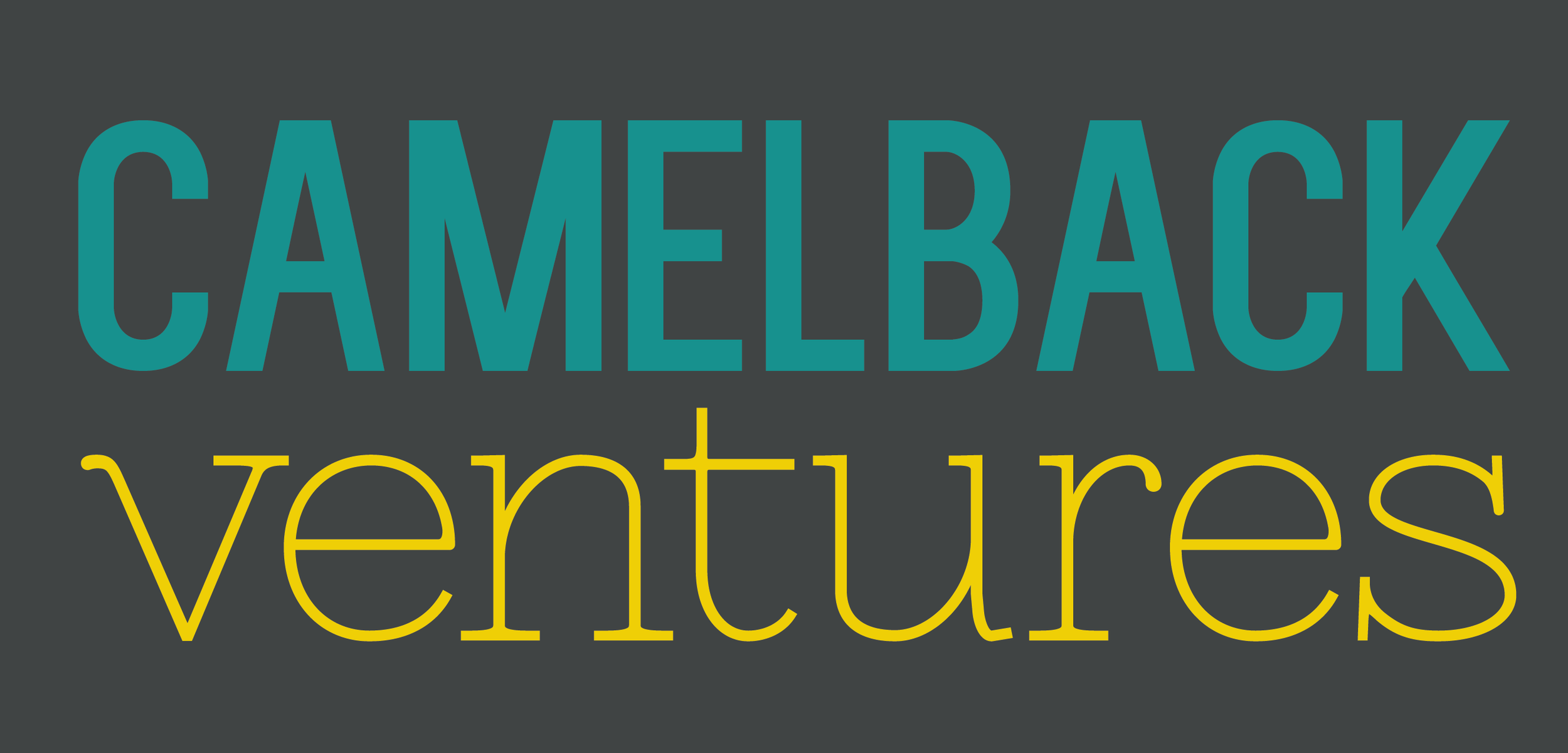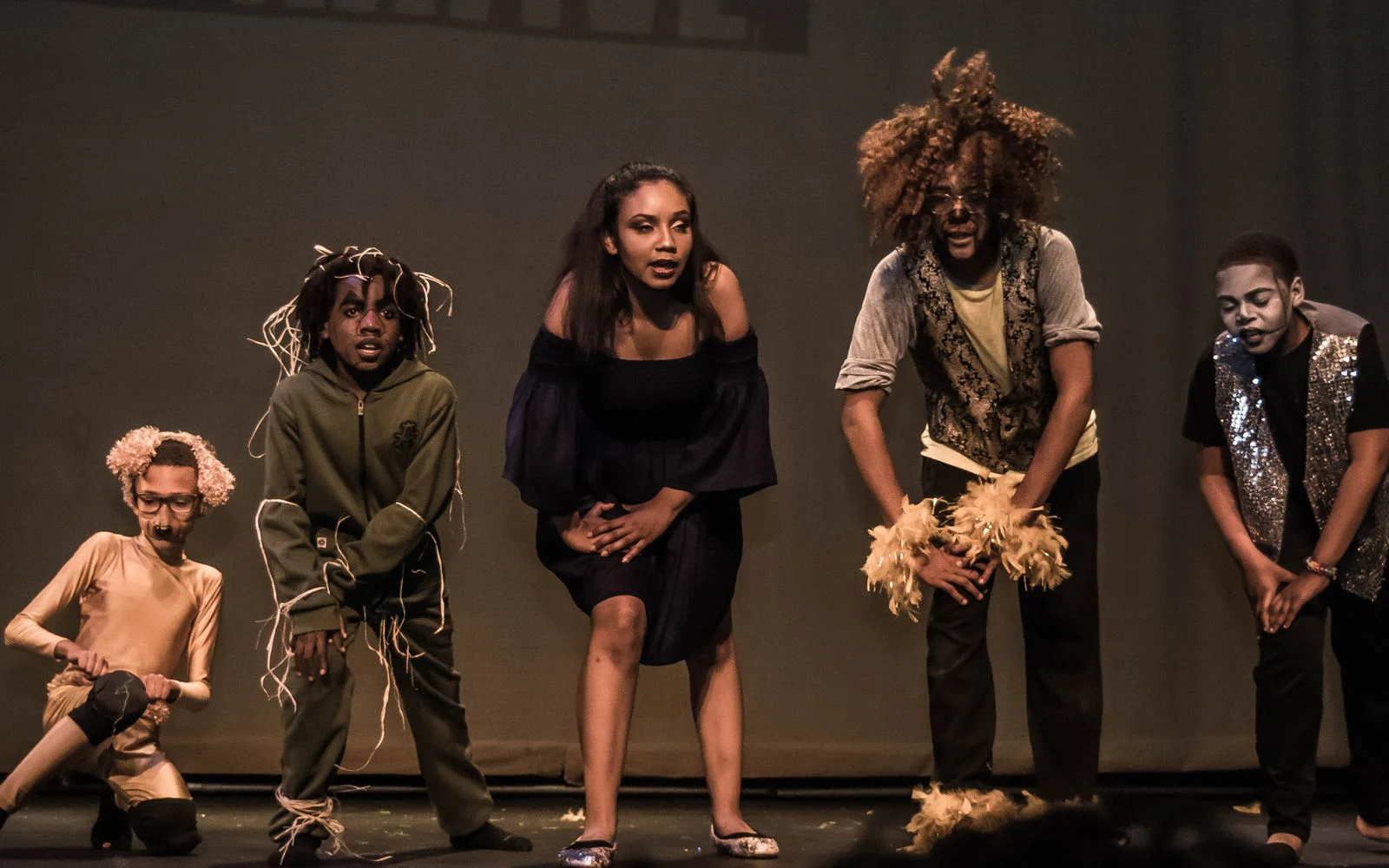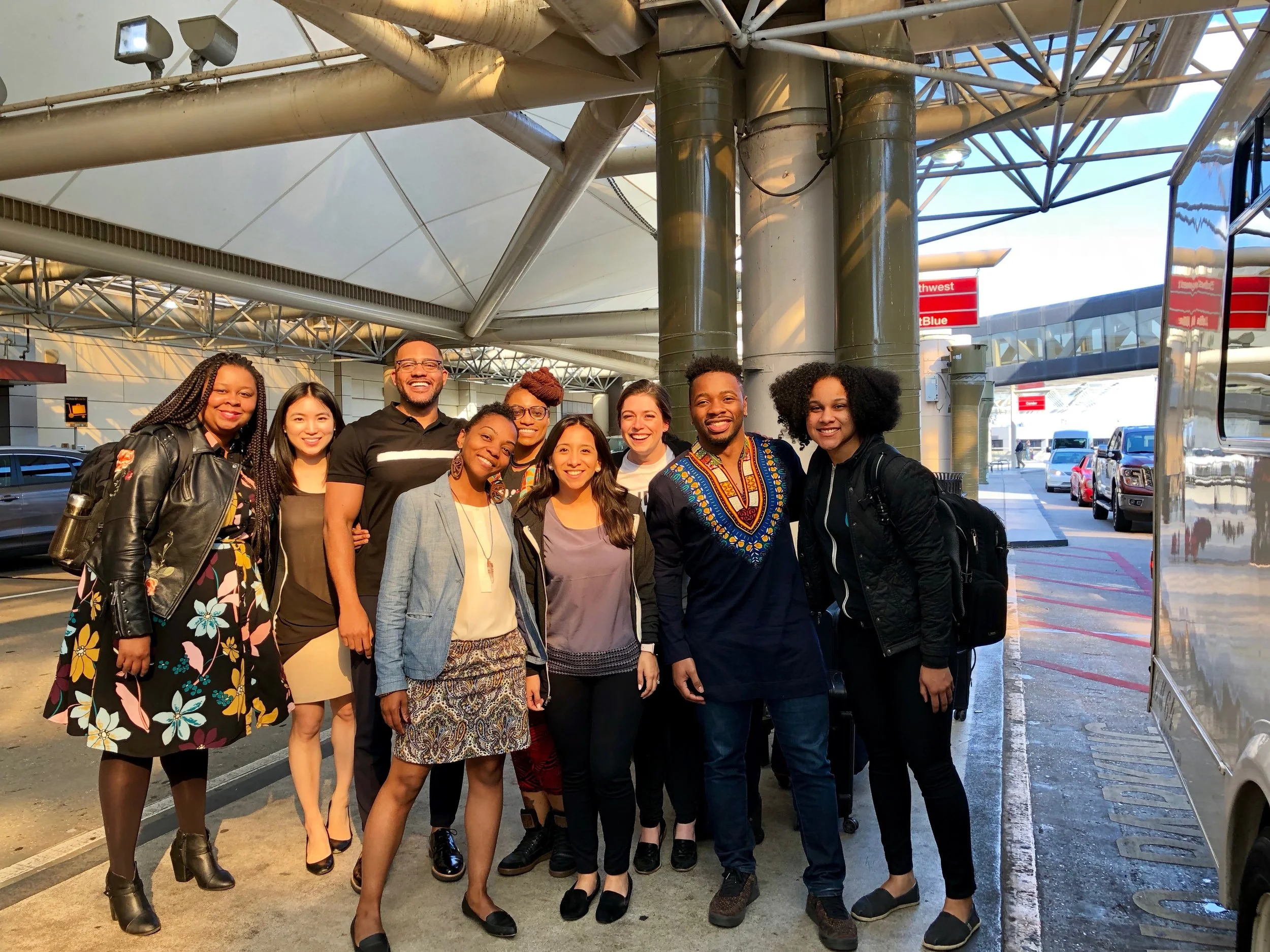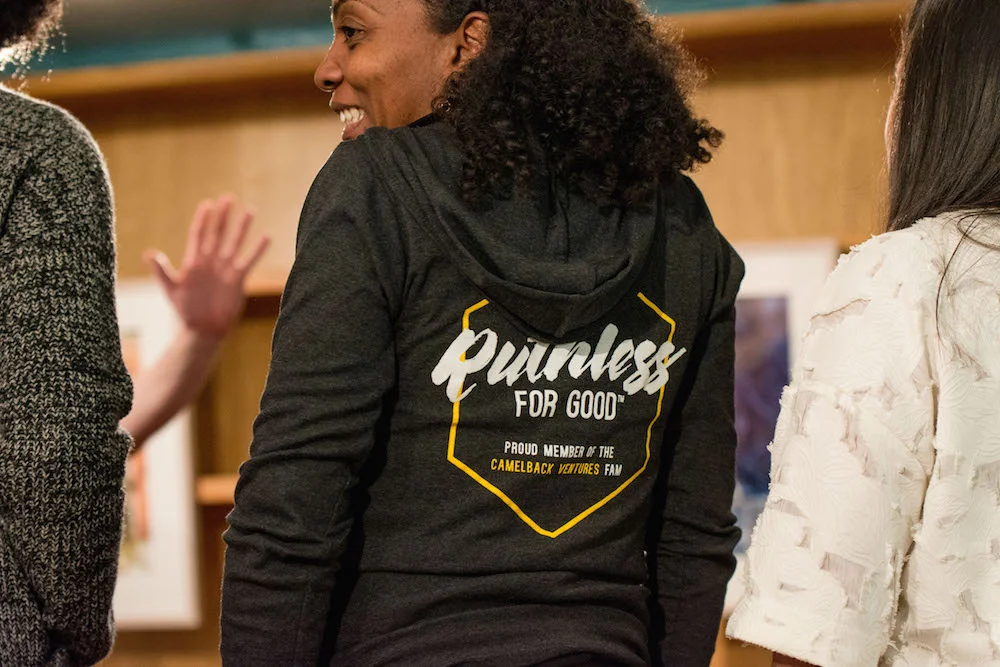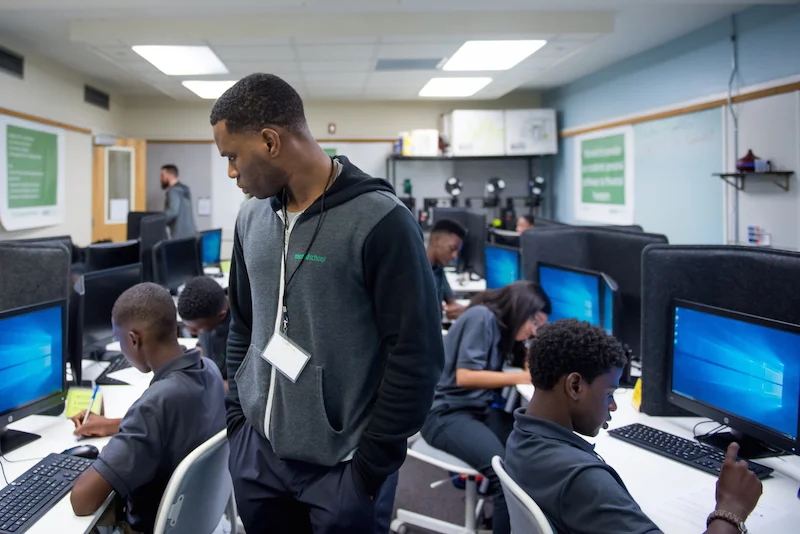Ruthless for Good: Auset Ali
We’re thrilled to be recruiting for our 2019 Education Fellowship. Over the next few weeks, we’ll be featuring Fellows from our most recent cohort as they share about their founder journey, Camelback application advice, and their Fellowship experience.
The Founder’s Journey
Amanda Tien from Camelback Ventures (CV): Tell me about the moment you knew it was time to start this school.
Auset Ali (AA): I had been leading Visions Performing Arts Company (VPAC) as an after-school program for ten ears. We were seeing our students attend the only arts high school in the area, in Denver, but they’d still come to our programs because they weren’t as engaged at their school. For about six months, parents and community leaders asked me to start a school, and I kept saying, “No, I’m not ready for that. I’m not looking to do that.” But then one of my most talented students came to me, and told me he had dropped out of the school of the arts. He was incredible at his art, but he was willing to give it all up because he didn’t feel rooted or understood or accepted at his school. And that’s when I knew. I started doing research and saw the extreme disparities of how underserved students of color were at that school, and I refused to accept that our students couldn’t have culturally relevant curriculum and pursue their craft. We piloted for three years and gradually scaled to thru results that our model was possible We changed the C from Company to College Prep and now, in our fourteenth year, we will be submitting our charter application in Spring 2018!
CV: What do you think makes Visions Performing Arts College Prep unique?
AA: I think that we set the bar higher for academics AND the arts. Our 3 C’s Values are to Complete their high school education with us, Continue with excellent preparation and Complete in the industry. We keep the foundation of identity for our babies so they never lose sight of who they are and what’s valuable about being a student of color in the arts. I want every student who graduates our high school to have the option of going to a great college or diving into the industry ahead with all the skills they’ve built. In 20 years, VPAC students will change representation in media and arts globally.
CV: While you’re building this school, is there someone who comes to mind for who you’re building it for?
AA: One of my students, Josiah, had looked up to the young man who had dropped out of the arts school. I could not let Josiah go through the same thing. Josiah had grown up loving Denzel Washington, memorizing his speeches from films, and has always known exactly what he wanted to do with his life. Josiah is my son -- and I need to make a school for him and others like him so that they never feel inadequate or unseen as they pursue their passions.
Josiah and other students in VPAC’s sold-out performance of The Wiz
CV: Think back to the beginning. What was something you did early in the process that you're really glad you did? A mistake?
AA: I’m glad I let the community encourage me to stay grassroots for so long. My first generation of students now bring THEIR children to the programming, and that’s amazing. I’m proud that we didn’t rush into outside funding, and that empowered us to really create what we wanted to do to serve our community.
I wish I would have asked for more help earlier on. There’s this unfortunate pressures for Black womanhood of “you gotta figure it out.” I did that both in my personal life and in VPAC. VPAC became so much about my identity, that when it was time to separate, the community went through a grieving process. They didn’t understand why I couldn’t teach dance and theater class any more, and why I was moving into this more executive only work. I could’ve brought on other people earlier to help with those decisions.
The Camelback Application Process
CV: What made you decide to apply to the Camelback Fellowship?
AA: I found out about the opportunity from another Camelback Fellow, Wisdom Amouzou — we were both in Moonshot Ventures together in Denver. He said, “You don’t have a choice, you have to apply to this,” and he put this flyer in my hands. But honestly, I was tired -- I had been applying to tons of grants and programs, and didn’t even think about researching another thing. During a dance practice, I asked one of my students, Natalia, to grab my phone from my purse, and she actually found the flyer in there. She loved how it looked, what it described. She thought it was cool and was just like, “You HAVE to do this.”
It felt like this divine calling from the universe. It was two days before the application was due, and Natalia just kept encouraging me to do it. I was panicking, I had all these typos in my app and I was so self conscious of rushing to finish it. But Natalia would say, “If they believe in us, they’ll call you, they’ll see you and what you’re doing beyond the typos. And if you need coaching, that’s one of the things they’re going to give you!” She’s a junior in high school, and she is just incredible. She’s very clear that as long as I build this school, she’ll take my job and be the executive director some day.
And Natalia didn’t leave my side, either. I reviewed all my answers with her and a group of students who volunteered to follow the process. It was important to me to have their insights, and to know that even when I got nervous, I was building this for them.
CV: What was the hardest part of the application process? What could you have done better at? What do you think you did really well?
AA: The first thing that comes to mind is comparing the process of Camelback to other Fellowships I was applying to. I was so tired at that point of playing the game, and I knew my students didn’t really understand what that meant. They encouraged me to be authentic. On paper, Camelback sounds like something you can be authentic with -- but a lot of programs say they want the whole you, but don’t always want your whole self and they’ll ask you to tone it back. So when I got to the third round, I struggled preparing. It felt risky. I didn’t know how I would feel comfortable showing up -- you know, am I going to feel that connection and do me, or am I going to put a face on? I was still learning how to do this, and it was a tough crossroads. You and your co-interviewer actually made me feel so welcome and seen -- I came away feeling like I had two new sistahs who believed in my work, even if I didn’t get the Fellowship. And I felt I made the right call. I trusted myself that I could show why I’m a good leader, and show why I needed the tools of Camelback. I’m really glad that I was authentic and open and honest about what I was great at, and also what I needed to grow.
I think the second tough part was waiting, and not feeling that doubt. It’s such a long process. And you know there were so many people who applied, and every round it gets smaller. People you love get to the same round, and they’re good too, and you’re so conflicted. I dealt with those feelings in writing these long Facebook posts, which I didn’t really do before. I would share my experience and my message of building and confidence. I was conscious of Natalia and Josiah seeing these. I had so many people in my corner who were rooting for me, who had seen the videos, who had done the research. I think I shared so much partially because I wanted my kids to see it...and really, I think I was coaching myself into believing it too. To own it, to believe that I was worthy of every step.
Your Camelback Fellowship Experience
CV: How did you grow as a leader from the Fellowship?
AA: When you’re an applicant or leader, you already know what your strengths are. That means a lot of your supporters accept your strengths, and they’re not coaching you to be better -- I was always a good storyteller and speaker. As a Camelback Fellow, I was able to show up with people who were just as good as me if not better and they pushed me. Why are you telling this story? You have this own story? Your why should be your son! Now, I’m not afraid of funders and I’m not afraid of data. Those were huge fears for me because both have damaged my community for so long -- but I need to be able to clearly tell our story to all audiences, and to use data as a power and a tool for me. So Camelback’s core competency Pitch ready helped me so much. I know VPAC is worthy of getting funding, and I know that 100%. The data don’t lie.
Camelback also just taught me a lot of great tools. Some worked better than others. But what I liked is that we were given these resources and self-knowledge, and able to build with coaches the way we were individually going to grow. I brought so many of those tools back with me, and actually just ran a Board retreat decked out in Camelback gear and using learnings from Summits. We’d been doing well, but this helped us really get into shape. We’ve been doing but we still needed to get in shape.
Impromptu cohort airport photo after Summit 1 in New Orleans
CV: Thinking of your relationships with other Fellows -- tell me about one of your peers that you learned from and that experience.
AA: All of the Fellows taught me something. Seriously. Every last one of them. When my cohort wins, we all win. I made a connection for every person for how I myself can serve them or introduced them to someone in my network. That’s my tribe!
I want people to know that our cohort is intentional about being a family. If you’re coming into Camelback, this is not the Euro-centric individualism, I’m here to get what I need -- you need to release all of those thoughts. You need to come in and be whole-leading, holistic, approach -- know that your leadership is impacting all leaders across the country.
CV: Any last advice about the Camelback or entrepreneur journey?
AA: If you get into the program, be clear about what the deliverable you want once you’re done with the Fellowship. Do you want a fundraising plan? Do you want a charter app done? You want to get coached on your big goals throughout the experience.
Observe Camelback as if you are observing a classroom. We are the Aarons of our organization. We need to see the way he hired his time, how he got this awareness, how he moves in the space. Observe the leader and bask in the access of him and the entire amazing team, because he’s really built a phenomenal team of experts to help you and guide you.
And the application itself...it’s so worth it. I decided that if I didn’t get in, I was going to try and keep trying until I did. “Just know that if you say no to me, you’re gonna get this application next year, even better!” It’s great that the Fellowship is well-known and gives you a lot of cred. But there is no other space where you are 100% able to be who you are like this -- you need to have a space to be inspired and to think about how you want to create culture in your own organization. If you’re going to keep doing this work, then keep applying! You want Camelback as a resource, and you want it as a tribe.
To learn more about Auset and VPAC, view her Camelback profile here or visit their website.
